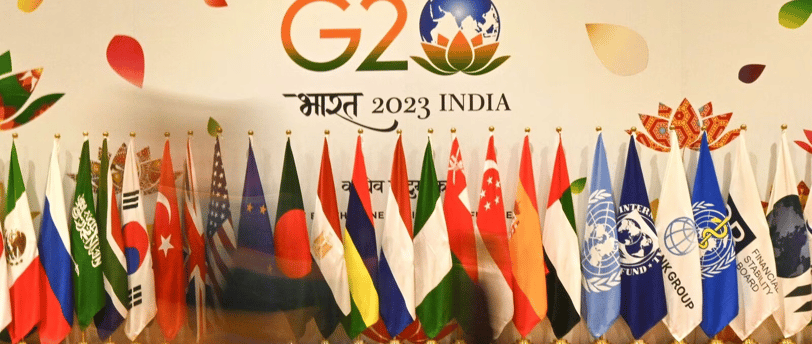What positive outcomes did India’s G20 presidency have?
GOVERNANCE
2/15/2024


The G20 Summit of 2023 recently concluded in New Delhi, marking the first-ever G20 summit hosted by the country under the leadership of Prime Minister Narendra Modi. The Summit’s theme, “Vasudhaiva Kutumbakam”, meaning “One Earth, One Family, One Future,” has its roots in Sanskrit texts.
India was successfully able to achieve full consensus around the New Delhi Declaration, which saw a dilution in the position taken by the U.S. and Russia, besides focus on Sustainable Development Goals, climate action and green development initiatives, digital public infrastructure, multilateral financing, artificial intelligence (AI), and interstates taxation, among others.
Prime Minister Modi and the country view this Summit as a diplomatic milestone for New Delhi, with its G20 presidency to serve as a platform to raise the Global South’s concerns. At the Summit, India was able to leverage its rising economic significance to garner support from all G20 member states for a Leaders’ Declaration recognising the conflict in Ukraine without specifying any aggressor. Prime Minister Narendra Modi, who chaired the G20 Summit, underscored reforming global institutions like the United States Security Council (UNSC) to align with the changing world, which received backing from the United States.
All 83 paragraphs of the New Delhi Leaders’ Declaration were unanimously approved, achieving 100 per cent consensus, even with Russia and China in agreement. This Declaration contained no footnotes, making it a historic moment.
In these 83 paragraphs, multiple agreements pertaining to the Finance Track were embedded. Team Modi emphasised a clear path for regulating cryptocurrencies, a concrete strategy for strengthening multilateral development banks, and the deployment of digital public infrastructure to enhance financial inclusion. Team Modi underscored the importance of a faster debt relief plan for vulnerable states.
Regarding climate change, the Delhi Declaration stressed the urgency of mobilising “$5.8-5.9 trillion in the pre-2030 period for developing countries” and $4 trillion per year for clean energy technologies by the year 2030 to achieve net-zero greenhouse gas emissions targets by the year 2050.
African Union was accepted as part of the G20. Before this, the only African member of the G20 was South Africa. The African Union, which represents 55 countries on the African continent, was given full membership, similar to how the EU is represented in the G20 grouping.
India, under the leadership of Prime Minister Narendra Modi, has successfully positioned itself as a champion for developing and underdeveloped states and sought to align this with a permanent seat on the UNSC. Prime Minister Narendra Modi also invited Nigeria, Mauritius and Egypt to be ‘Guest Countries’ at the G20 summit.
During the G20 Summit, a Memorandum of Understanding (MoU) was signed among India, the U.S., Saudi Arabia, the European Union, UAE, France, Germany, and Italy to establish the India–Middle East–Europe Economic Corridor (IMEC). IMEC has been envisioned as a network of transportation routes encompassing railways and sea lanes. Its main objective is to promote economic development and foster integration between Asia, the Arabian Gulf, and Europe.
This project falls under the Partnership for Global Infrastructure Investment (PGII) to support global infrastructure projects. The PGII’s aim is to mobilise funding for critical infrastructure development, including roads, bridges, ports, and communication systems, to enhance global trade and commerce.
While no leader explicitly mentioned China, it was conspicuously clear that the IMEC corridor hopes to become an alternative to China’s Belt and Road Initiative (BRI), which seeks to establish global connectivity linkages with China through extensive shipping, rail, and road networks, since its conception ten years ago in 2013.
Moreover, the G20 endorsed a goal to triple global renewable energy capacity, emphasising the need for emissions to peak before 2025. Additionally, the Delhi Declaration acknowledged that limiting global warming to 1.5 degrees necessitates a 43 per cent reduction in greenhouse gases by 2030 as compared to 2019.
The G20 Delhi Declaration also featured commitments to mainstream Lifestyle for Environment (LiFE), provide sustainable finance, implement sustainable energy transitions, reaffirm the pursuit of Sustainable Development Goals (SDGs), address plastic pollution, and preserve the ocean-based economy. The Summit also witnessed the launch of the Global Biofuel Alliance (GBA) by Indian Prime Minister Narendra Modi, a new organisation aimed at promoting and encouraging the development and adoption of sustainable biofuels, along with establishing relevant standards and certification.
During the Summit, Prime Minister Modi also engaged in bilateral meetings with world leaders. The PM symbolically handed the G20 presidential gavel to Brazilian President Lula, expressing hope in India’s successor to promote global unity and prosperity.
PM Narendra Modi also addressed issues of mutual interest with the world leaders. In one notable meeting, the Prime Minister raised New Delhi’s deep concerns regarding extremist elements in Canada supporting secessionism, inciting violence against Indian and Indian diplomats, and threatening the Indian community In Canada. President Biden underscored the strategic partnership between India and the U.S., which is deeply rooted in Mahatma Gandhi’s principle of trusteeship, shared by the two states.
Russia praised the G20 under India’s presidency as a “breakthrough,” highlighting its outcomes to showcase the strength and importance of the Global South and as a roadmap for addressing global challenges. PM Modi also discussed enhancing trade, commerce and infrastructure partnership with Turkiye President Erdogan.
Several world leaders at the Summit congratulated Prime Minister Narendra Modi on the success of ISRO mission Chandrayaan-3. Japanese PM commended PM Modi for the “Mission LiFE” initiative proposal.


